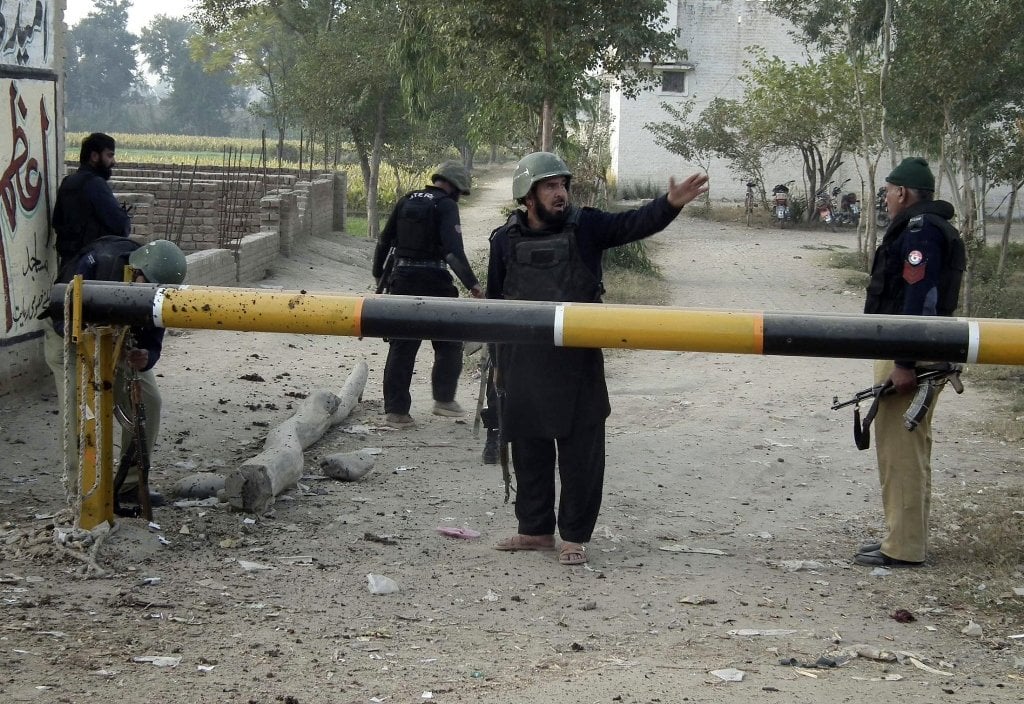
ISLAMABAD:
Pakistan witnessed a 43% drop in the overall suicide attacks during 2014 as compared to 2013, with a decreasing trend of terrorist attacks and fatalities, which went down by 30% during the year.
According to Pakistan Security Report 2014 issued by Pakistan Institute of Peace Studies (PIPS) on Tuesday, around 1,723 people were killed and 3,143 were injured during 2014 in a total of 1,206 terrorist attacks – including 26 suicide hits – carried out by militants, nationalist insurgents and violent sectarian groups.
While the number of terrorist attacks decreased by 30%, the overall number of people killed and injured in these attacks also decreased by 30% and 42% respectively.
The report reveals that in 436 (or 36%) of the total reported incidents, security forces and law enforcement agencies were exclusively targeted.
With the exception of Punjab, which witnessed 8% rise in terror attacks with 41 reported incidents, the rest of the country saw a relative improvement with 30% decline in the number of terrorist attacks.
During the year, Khyber-Pakhtunkhwa (K-P) witnessed 26% decrease with 325 attacks, Balochistan a 32% drop with 341 assaults and Karachi 40% decline with 217 attacks.

According to the report, 325 terror attacks were carried out in the K-P, in which 542 people were killed and 892 were injured. In Balochistan, 375 people were killed and 926 injured in 341 attacks. In Fata, 234 attacks were mounted, which left 293 people dead and 389 injured.
Punjab faced 41 attacks, which claimed 126 lives and injured 274 people. In Karachi, 217 attacks killed 317 people and injured 438. In the rest of Sindh, terrorists carried out 31 attacks and killed and injured 23 and 63 people, respectively. In Islamabad, 14 terror attacks were reported which left 44 people dead and 212 wounded. In Gilgit-Baltistan, terrorists struck three times and killed three people.
The security forces launched a total of 130 operational strikes against militants in 23 districts and regions – most of which fall in the North Waziristan and Khyber agencies of Fata and killed 1,917 militants. Nine civilians, one FC soldier and three army troops were also killed in these operations as a collateral damage.
In all, as many as 2,099 incidents of violence were reported from across Pakistan in which a total of 5,308 people were killed and 4,569 were injured.
These incidents included terrorist attacks, military operations, incidents of ethno-political violence, drone attacks, inter-tribal, inter-militant clashes, cross-border attacks and clashes and abductions by militants and nationalist insurgents.
The PIPS report also identifies challenges faced by Pakistan in connection with internal security.
These challenges include internal threats such as changing dynamics of terrorist groups amid internal rifts and influence of a Middle Eastern militant group Islamic State, growing faith-based violence and hatred, cross-border terrorist networks, internally displaced persons, lack of prison security and reforms, changing tactics and targets by terrorists and illicit weapons.
The report identifies Balochistan as the most critical region where issues of enforced disappearances and recovery of bodies cause major impediments to any reconciliation process to be launched by the provincial government
Recommendations
Besides underscoring the need for taking up some immediate policy initiatives such as better policing, counter-terrorism legislation and a multifold reintegration programme for banned militant and sectarian groups, the report also recommends establishing a national dialogue forum to evolve a counter-extremism narrative and strategy.
It also recommends giving the role of coordination among institutions to the Cabinet Committee on National Security, to launch de-radicalisation programmes at provincial level, to effectively manage IDPs, and to improve and strengthen the criminal justice system.
In order to neutralise violent extremist tendencies, the report recommends the government to initiate a reintegration scheme. “Under this scheme the government can offer amnesty to banned groups that agree to quit violence inside and outside the country,” it says.
Published in The Express Tribune, January 7th, 2014.




















































COMMENTS
Comments are moderated and generally will be posted if they are on-topic and not abusive.
For more information, please see our Comments FAQ